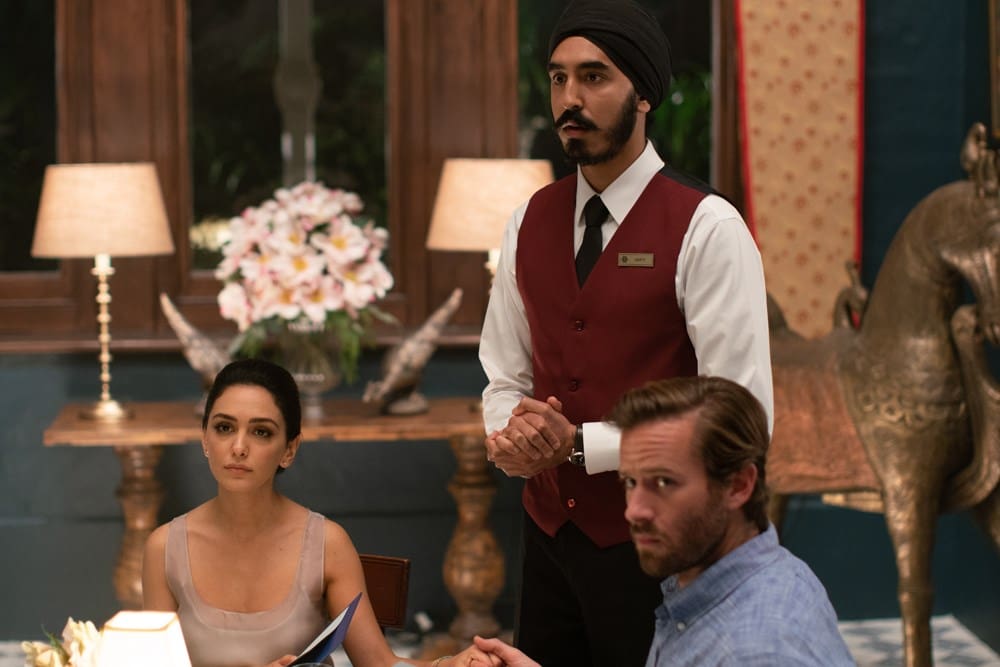
Written by Tom Moore
Evoking feelings of terror and a choking sense of fear about as real as the true event it’s based on, Hotel Mumbai pulls no punches in how grippingly real it desires to be and it leads to an experience that’s eye-opening and stomach-turning.
Based on the terrorist attacks that occurred in 2008 in the Indian city of Mumbai, the film follows a group of hotel guests and staff (Dev Patel, Armie Hammer, Nazanin Boniadi) after a group of terrorists take over the Taj and murder everyone they see. In order to stay alive, the group must sneak through the hotel and hide in order to survive the night.
Often times, films that touch on tragic true events can feel have too much “movie-magic” and the weight of the film’s events don’t really hit you. In the beginning, I pretty much felt this way as the way characters are introduced through painful exposition. There’s even a scene where the hotel’s kitchen manager, Oberoi (Anupam Kher), literally introduces some of the characters by sharing details about their personality and even food preferences. It makes sense in the context of the film for these characters to be introduced like this, but as a viewer, it felt like he was reading stats off of their baseball cards rather than letting us get to know them.
However, once the film’s central plot begins, it brings some of the most tragically realistic violence that I’ve seen in a while and it left me breathless and gripping my seat with uncomfortable tension. The film doesn’t hold anything back and seeing bodies drop, the legitimate terror on the faces of everyone hiding, and the tight camera shots really hit you. Hotel Mumbai is generally considered to be a historical drama or thriller, but it feels like a horror movie that immerses its audience into a horrifying true event.
A lot of the film’s horror comes from its depictions of the terrorist group. The performances are bad, they are just vile people that will make you sick to your stomach with how evil they are. This depiction, while effective in making the situation terrifying to watch, is off-putting and odd when the film attempts to humanize or create situations to make it seem like they are second guessing themselves. Watching these moments left me confused and didn’t connect with me at all because my feelings of hatred were so well-cemented that nothing was going to make me think of them any differently.
The only characters you’ll undoubtedly feel for are the group of survivors who are interesting and intelligent enough to feel like real people. Patel was the clear standout for me, and he showcases his characters desire to do what’s right and how his Indian culture is important to him. There are even some scenes that seem like they are going to do a Hollywood style story plot point, but go for a more realistic approach.
In one scene, an older white woman wants Patel’s Arjun to take his pagri, commonly known as a turban, off because she is afraid he is one of the terrorists because of the way he looks. In a more conventional film, Arjun would take it off, but it would create tension that would come to a head later. However, Hotel Mumbai never really goes for this and instead presents a scene where Arjun respectfully confronts the woman and explains why keeping his pagri on is important to him and why she has nothing to fear. Not only does this approach feel more genuine to Arjun’s character, but it reflects the idea of Hotel Mumbai being a more realistic take on this tragedy and I respected that.
Overall, Hotel Mumbai is undeniably a depressing and tough watch, but that’s only because of how grippingly real it feels. It almost feels like a trip through a tragic hell and it’s tough to not get emotional or imagine the horror the survivors will never forget. It’s a film that’s really stuck with me and that has impressed me in a way to other films.

